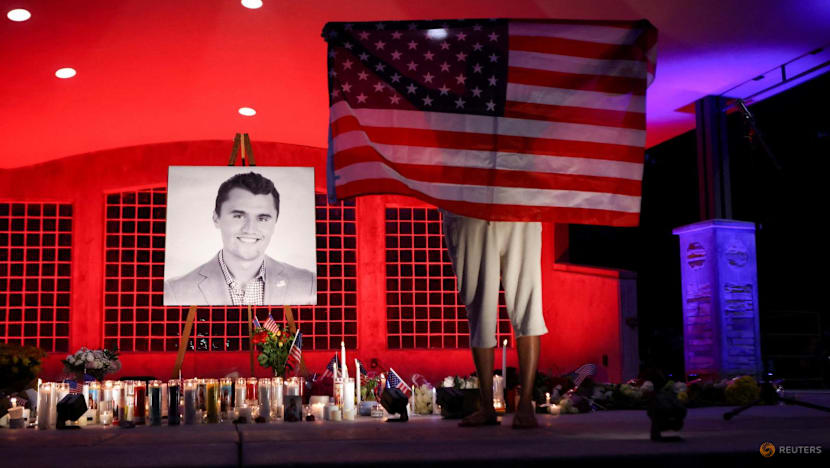World
Charlie Kirk’s Legacy Reflects a Divided America

In a shocking turn of events, Charlie Kirk, a prominent conservative figure and founder of Turning Point USA, was killed on September 10, 2023. His death has sparked renewed discussions about the deep divisions within American society. Kirk was well-known for rallying young conservatives at events like AmericaFest, which he led in Phoenix, Arizona, where approximately 10,000 attendees gathered to hear speeches from various “America first” advocates, including Tucker Carlson and Ted Cruz.
Kirk’s influence extended far beyond the stage. For years, he shaped the discourse among young conservatives, addressing what he perceived as America’s decline. Through his national radio show and university tours, he reached millions, promoting a vision of America steeped in patriotism and traditional values. While his rhetoric sometimes included disinformation, Kirk also resonated with his audience on critical issues, reflecting a polarized nation.
Polarization and Emotional Divides
The current political landscape in the United States is characterized by profound polarization, a reality Kirk embodied. At AmericaFest, he positioned his followers as victims of contempt from those who oppose conservative values. This framing highlights a growing divide where individuals are categorized as either “loved” or “hated,” often leading to a climate of hostility.
Cultural theorist Sara Ahmed describes how emotional intensities shape societal divides. In her work, she argues that shared emotions like love and rage can create bonds yet simultaneously alienate others. This dynamic was palpable at AmericaFest, where speakers frequently criticized liberal academics and intellectuals, fostering an atmosphere of mutual distrust.
The consequences of this cultural schism extend to people’s living arrangements and social interactions. Many Americans are increasingly segregating themselves by political affiliations, leading to a form of “partisan segregation.” This shift has profound implications for community cohesion, as individuals retreat into echo chambers that reinforce their beliefs, while the larger societal fabric begins to fray.
A Longing for Connection Amidst Division
As discussions about cultural decay proliferate, many citizens express feelings of loss and anger. Conversations held in various social settings—ranging from community clubs to workplaces—reveal a shared sentiment that the American dream is slipping away. Issues such as environmental crises and economic instability contribute to a pervasive sense of insecurity.
Those who feel marginalized often seek solace in strong leadership, a sentiment that former President Donald Trump has adeptly tapped into. His focus on law and order and his portrayal of America as a nation in peril resonate with many who fear change. Yet, the critique of nationalist responses often overlooks the genuine anxieties prompting these reactions.
The upcoming 2024 US elections will likely serve as a barometer for this unrest. Many Americans are grappling with the implications of a rapidly changing society, leading to a spectrum of discomfort that transcends simple political labels. This complexity is particularly evident in the voices of younger generations, such as Ines, a participant in recent research. She articulated a profound sense of unease: “Generations that are growing up now don’t know a world where there wasn’t a school shooting every week… we were born into disaster.”
Despite the pervasive anger and division, there remains a strong desire for connection. Across the political spectrum, individuals yearn to be part of something larger than themselves, seeking communities that foster care and mutual support. This longing for connection, even amid anger, underscores a potential path forward.
While the challenges are formidable, the potential for rebuilding relationships and fostering understanding exists. As society navigates these turbulent times, addressing the emotional undercurrents that drive division may hold the key to healing.
Melissa Butcher, Professor Emeritus in Social and Cultural Geography at Royal Holloway, University of London, emphasizes the importance of fostering connections to combat feelings of loss and ambivalence. By prioritizing meaningful relationships, communities can work toward overcoming the fractures that threaten to deepen societal divides.
In the wake of Charlie Kirk’s death, his legacy serves as a reminder of the urgent need for dialogue and understanding in a nation grappling with its identity.
-

 Business5 months ago
Business5 months agoKenvue Dismisses CEO Thibaut Mongon as Strategic Review Advances
-

 Lifestyle4 months ago
Lifestyle4 months agoHumanism Camp Engages 250 Youths in Summer Fest 2025
-

 Sports4 months ago
Sports4 months agoDe Minaur Triumphs at Washington Open After Thrilling Comeback
-

 Sports5 months ago
Sports5 months agoTupou and Daugunu Join First Nations Squad for Lions Clash
-

 Top Stories5 months ago
Top Stories5 months agoColombian Senator Miguel Uribe Shows Signs of Recovery After Attack
-

 World5 months ago
World5 months agoASEAN Gears Up for Historic Joint Meeting of Foreign and Economic Ministers
-

 Health4 months ago
Health4 months agoNew Study Challenges Assumptions About Aging and Inflammation
-

 Business5 months ago
Business5 months agoOil Prices Surge Following New EU Sanctions on Russia
-

 Entertainment4 months ago
Entertainment4 months agoDetaşe-Sabah Violin Ensemble Captivates at Gabala Music Festival
-

 Entertainment4 months ago
Entertainment4 months agoBaku Metro Extends Hours for Justin Timberlake Concert
-

 Top Stories5 months ago
Top Stories5 months agoRethinking Singapore’s F&B Regulations Amid Business Closures
-

 Business5 months ago
Business5 months agoU.S. House Approves Stablecoin Bill, Sends to Trump for Signature









